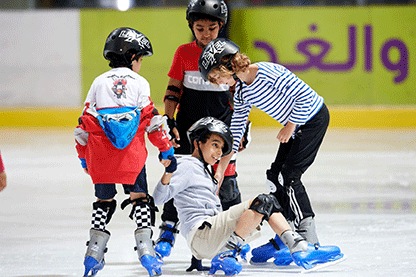Developing True Sportsmanship: 5 Ways Parents Can Help Kids Learn from Losses

For parents, nothing is more difficult and heartbreaking than seeing your child dismayed and disheartened over things you cannot control, such as losing a sports event. When you see how hard your child trains each day in preparation for a game, like a tennis match or an ice skating competition, it can be challenging for you to know how to best support him when he fails to win.
However, failure is always a part of success. Experiencing and rebounding from loss is indeed actually a benefit of participating in competitive sports and tennis camps as losses offer valuable lessons. The next time your young child fails to achieve the victory he worked hard for, sit him down, help him understand and accept defeat, and give him tools to cope with it in a healthy way.
Our coaches at ZSC Academy share these five ways for you to help your child learn from losing and develop true sportsmanship.
1. Let them release emotions
A child who takes his sport seriously may not accept defeat easily and instantly. When he loses, he is very likely to cry and be frustrated about it, especially if he is still young.
It is normal for parents like you to feel sorry for him, but it’s best to remember that the tears mean that he truly cares about the sport, and as he grows up, he will learn to understand and manage this behavior.
Allow him to cry. Don’t teach him to suppress or be ashamed of his reaction. Instead, make sure to be there for him until he is ready to talk about the experience. As long as the reaction is not destructive, it is appropriate to express emotions in whatever way makes him feel better.
2. Explore possible distractions
If your child continues to feel sadness even after you have given him space to share his emotions, encourage him to seek other activities that distract him or keep him occupied.
While it is OK to be upset, the emotion should be acknowledged and allowed to pass. For some children, engaging in another activity speeds up the process. Suggest that he do some footwork drills or swings. If he declines, don’t insist. Instead, let him think beyond the loss and consider things that he can do next. Going for a walk, engaging in an art project or any number of other things can channel the negative energy out of his mind.
The important thing here is not to tell him exactly what to do or command him to do something he doesn’t want to do. It will develop independence and coping skills to allow him to decide for himself.
3. Set a great example
Always remember that you are your kid’s most vital role model. Yes, you will do anything for your little one, but don’t go overboard, especially when it comes to sports competitions. A strong negative reaction to the loss on your part will just heighten your kid’s disappointment and anxiety. Whatever your gut reaction may be, aim to keep your own emotions in check, remain calm, and be supportive of your child.
Always bear in your mind that if you say that the outcome must have been rigged, or if you complain about the game time, your child could learn to do the same. Instead of complaining, take a moment to think about your facial reactions, body language and behaviour, and who could potentially witness them. Greatness won’t happen in an instant; your child will not become great if he learns to complain about fairness or blame other people or factors each time he experiences losing.
It is important to explain to your child carefully that losing one competition, or several, doesn’t mean that he is not good at sports. Rather, this means that his opponent was better that day. Emphasise to him that in your eyes, he is a winner simply by trying and doing his best, and by striving to do better the next time around. Focus on things that can be controlled, such as efforts during practice, sleeping well and eating healthy foods.
4. Don’t act as their coach
Coaches at ZSC Academy are trained to properly coach your kids so they can become a great tennis player or ice skater. They hold internationally recognised credentials and have proven practical and theoretical experience. Parents, on the other hand, are usually without the qualifications of a coach. This means that giving sports advice and tips, or pointing out what your child should have done instead to clinch a win, while well-meaning, isn’t part of your remit.
Your role is to support your child. If you wish to give him some words of encouragement so he can focus more while practicing, consider doing at-home training. If not, it’s best to wait until he has totally calmed down before giving feedback.
5. Use the loss as a learning opportunity
Losing a sports competition is a great opportunity for your child to learn about the things he can do to perform better in the future. When it’s time to prepare for the next competition, talk to your child and discuss what went wrong during the last game and what new strategy he can try for the next one.
Blaming someone for the game’s undesirable outcome is a bad practice. Nobody actually sets out to lose, right? Instead, help your child draw lessons from his performance in the last match and figure out what efforts or actions may have contributed to that loss. He will then realise that he has a chance to approach the competition differently and to discover new actions that can lead to a better result.
Remember that there is an important lesson to be learned after every loss. Teach your young one to always focus on his efforts, perform as well as he can, and demonstrate good sportsmanship towards his fellow athletes, regardless of the outcome of the competition. If he wins after experiencing a loss, the victory will be that much sweeter – and remind your child that he would not have attained victory if he had simply stopped playing because of a failure, and reinforce the pride in the decision to brushing himself off and trying again.
Losing is not easy, and children must be taught not to get consumed with disappointment and frustration at the things that went wrong. Always support your child, show an appreciation of their efforts, and let them learn positive lessons from that loss.





